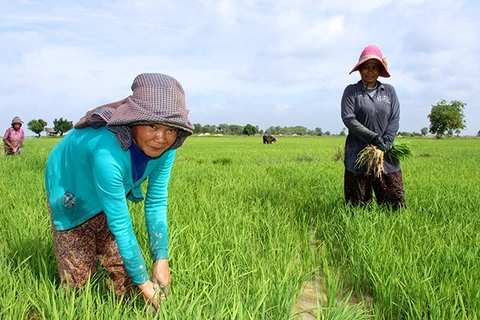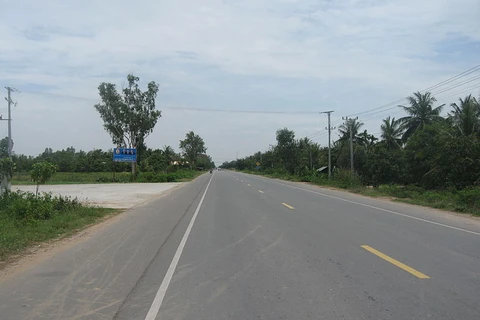Jakarta (VNA) - The World Bank (WB) has warned that the Indonesian economy might contract 2 percent this year if mobility restrictions are further implemented to contain the spread of COVID-19, local media reported.
“Under somewhat harsher assumptions on the global economy of a deeper contraction, and if there is a need for mobility restrictions to be reinstated going forward, we do think that the economy could actually contract by 2 percent in 2020,” The Jakarta Post newspaper quoted World Bank Indonesia lead economist Frederico Gil Sander as saying during the virtual launch of World Bank’s Indonesia Economic Prospect report on July 16.
The coronavirus outbreak in Indonesia has not shown any signs of abating as more than 1,000 new cases have been recorded daily since June. Infections stood at 81,600 as of July 16 afternoon with 3,800 deaths, according to official data.
Despite the rising number of cases, the government and regional administrations relaxed social restrictions amid concerns of a slumping economy.
The government projects the country’s economy to grow by 1 percent this year under the baseline scenario or contract by 4 percent under the worst case scenario as the pandemic batters business activity and hits demand. The economy grew 2.97 percent in the first quarter, the lowest in 19 years.
The WB’s report, titled The Long Road to Recovery, published this month, states that Indonesia’s GDP is expected to be unchanged from 2019. Last year, the country’s GDP grew 5 percent.
World Bank Indonesia Country Director Satu Kahkonen explained during the webinar that the zero percent growth forecast was predicated on three things, namely the global GDP to contract by 5.2 percent this year, the economy to be fully open in August and no second wave infections.
The report suggested that a 2 percent contraction would take place if the global economy slipped into a deeper recession, wherein the global GDP shrank by 7.8 percent, impacting investment and exports.
Sanders said that under this scenario where the economy would actually contract, poverty would increase quite significantly, especially if there is no additional social assistance.
The WB estimated that without the government’s social assistance, 5.5 million to 8 million Indonesians could fall into poverty this year as a result of an aggregate decline in household income of 5 percent to 7 percent due to lower earnings and unemployment.
Around 1.63 million people fell into poverty in March, increasing the number of people living below the poverty line to 26.42 million people, Statistics Indonesia (BPS) data show.
According to Sanders, aside from ensuring robust health system preparedness to handle the pandemic curve, the government needs to assist firms to stay afloat and push for reforms to increase financial sector resilience.
Most importantly, he said, the government should invest more on human and physical capital as the post-COVID-19 economy was likely to require different skills from workers. The country also needed to flatten its debt curve when it started to recover.
According to the Finance Ministry, Indonesia’s borrowing needs of around 1.53 quadrillion rupiah (104.53 billion USD) this year to fund the budget deficit will increase the country’s debt-to-GDP ratio to 37.64-38.5 percent by year-end from around 30 percent in 2019.
The government has allocated 695.2 trillion rupiah to help strengthen the healthcare system, provide social aid and support economic recovery./.
“Under somewhat harsher assumptions on the global economy of a deeper contraction, and if there is a need for mobility restrictions to be reinstated going forward, we do think that the economy could actually contract by 2 percent in 2020,” The Jakarta Post newspaper quoted World Bank Indonesia lead economist Frederico Gil Sander as saying during the virtual launch of World Bank’s Indonesia Economic Prospect report on July 16.
The coronavirus outbreak in Indonesia has not shown any signs of abating as more than 1,000 new cases have been recorded daily since June. Infections stood at 81,600 as of July 16 afternoon with 3,800 deaths, according to official data.
Despite the rising number of cases, the government and regional administrations relaxed social restrictions amid concerns of a slumping economy.
The government projects the country’s economy to grow by 1 percent this year under the baseline scenario or contract by 4 percent under the worst case scenario as the pandemic batters business activity and hits demand. The economy grew 2.97 percent in the first quarter, the lowest in 19 years.
The WB’s report, titled The Long Road to Recovery, published this month, states that Indonesia’s GDP is expected to be unchanged from 2019. Last year, the country’s GDP grew 5 percent.
World Bank Indonesia Country Director Satu Kahkonen explained during the webinar that the zero percent growth forecast was predicated on three things, namely the global GDP to contract by 5.2 percent this year, the economy to be fully open in August and no second wave infections.
The report suggested that a 2 percent contraction would take place if the global economy slipped into a deeper recession, wherein the global GDP shrank by 7.8 percent, impacting investment and exports.
Sanders said that under this scenario where the economy would actually contract, poverty would increase quite significantly, especially if there is no additional social assistance.
The WB estimated that without the government’s social assistance, 5.5 million to 8 million Indonesians could fall into poverty this year as a result of an aggregate decline in household income of 5 percent to 7 percent due to lower earnings and unemployment.
Around 1.63 million people fell into poverty in March, increasing the number of people living below the poverty line to 26.42 million people, Statistics Indonesia (BPS) data show.
According to Sanders, aside from ensuring robust health system preparedness to handle the pandemic curve, the government needs to assist firms to stay afloat and push for reforms to increase financial sector resilience.
Most importantly, he said, the government should invest more on human and physical capital as the post-COVID-19 economy was likely to require different skills from workers. The country also needed to flatten its debt curve when it started to recover.
According to the Finance Ministry, Indonesia’s borrowing needs of around 1.53 quadrillion rupiah (104.53 billion USD) this year to fund the budget deficit will increase the country’s debt-to-GDP ratio to 37.64-38.5 percent by year-end from around 30 percent in 2019.
The government has allocated 695.2 trillion rupiah to help strengthen the healthcare system, provide social aid and support economic recovery./.
VNA























